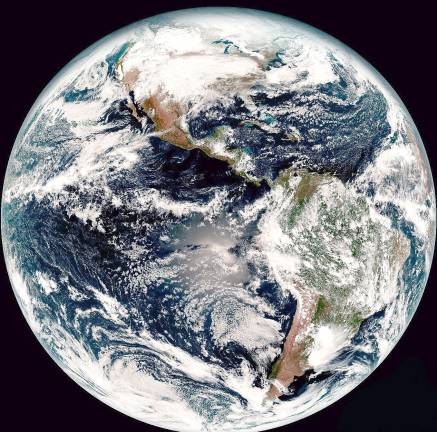"Some say the world will end in fire, some say in ice" wrote the great American poet Robert Frost towards the beginning of the last century.
A 21 century version of the poem might read: "Some say the world will end by warming, some say by plastics."
Finally global warming is getting some real public attention. On Sept., 20 millions of people worldwide marched to implore our legislators to take action to curtail the use of fossil fuels and switch to renewable energy sources.
Marchers also carried signs about the destruction of our oceans by plastics.
We hope that our lawmakers will heed us, and soon enough. What issue could be more important than the very preservation of the planet we live on?
But in the meantime do we just sit by and wait for them to act?
Actually each person has in their own hands a powerful tool if they would only use it: The power to do right now what legislation would only encourage some time in the future.
For example, instead of getting our electricity from fossil fuels, we can immediately change to a company that gets it from a solar farm nearby (and save money in the process).
We can turn down our heat a few degrees in the winter and turn the air conditioner thermostat up in the summer.
We can look into heat pumps to heat our houses.
We can buy our next car with energy efficiency in mind.
When it comes to decreasing our plastic usage it is even easier to be more effective. Every piece of the 8,000 metric tons of plastic that is dumped into our oceans annually was used by a person - and mostly for only a few minutes.
There is no denying that some of those pieces came from you and me.
Did we buy yet another plastic water bottle with the excuse that it can be recycled, (it probably won't), or did we refill our own reusable bottle?
When we chose our groceries did we have their packaging in mind? For example, buying juices in glass or fresh lemons for homemade lemonade?
What about choosing powdered laundry detergents instead of liquid in plastic?
Did we buy another box of baggies or did we choose a paper sandwich bag or waxed paper or store our left overs in bowls?
For our parties did we buy plastic plates, cups and silverware because they were a few cents cheaper than paper or biodegradables, or less trouble than washing up afterwards?
Finally, considering that plastic take-out bags make up about one quarter of the garbage in our oceans, did we bring our reusable bags or did we just use disposable plastic as usual? When we forgot our bags in the car did, we just take more plastic, hoping that we remember them next time? (We probably won't.)
Or did we leave our cart by customer service and go back to the car for them, thus establishing a new habit?
While we have to strive for changes on the large scale we should not underestimate the power each person has right now in their own hands to reverse global warming and plastic pollution. It all boils down to making the connection to what the problem is and what we ourselves are doing to cause it.
Because as many of the signs on Sept. 20 said," there is no planet B."
Julia Calderon
Warwick
